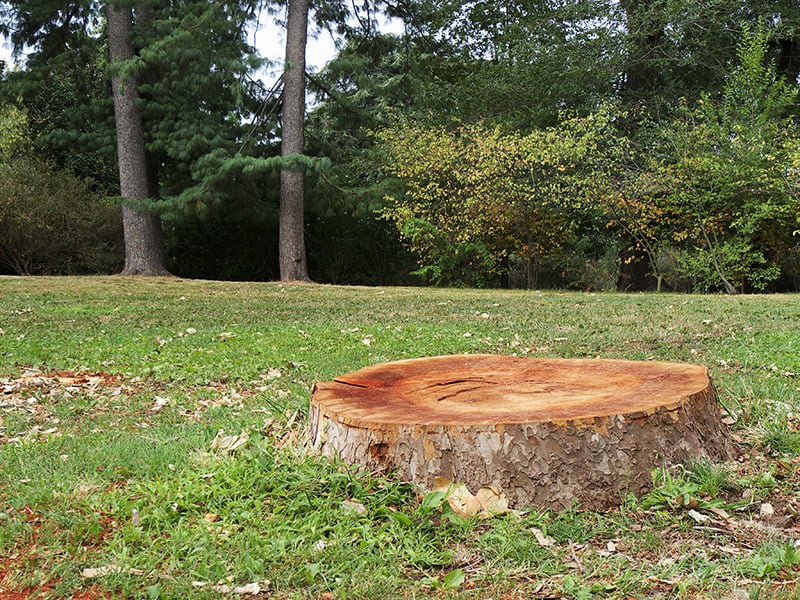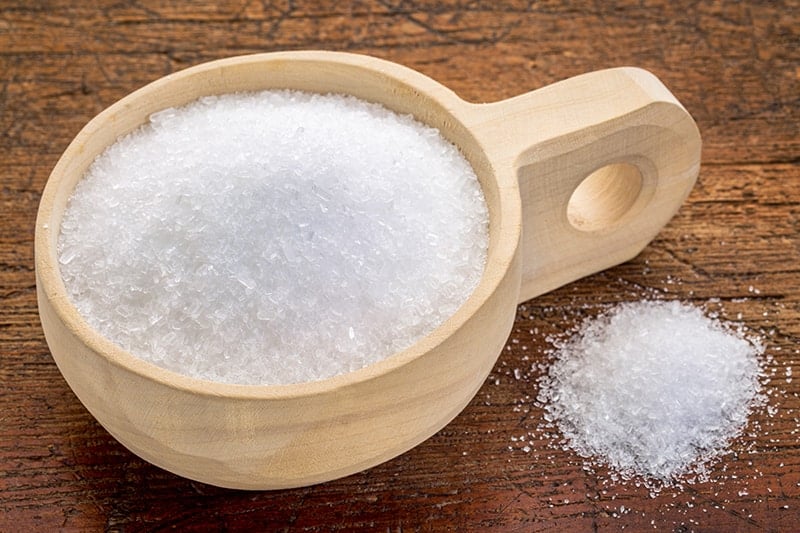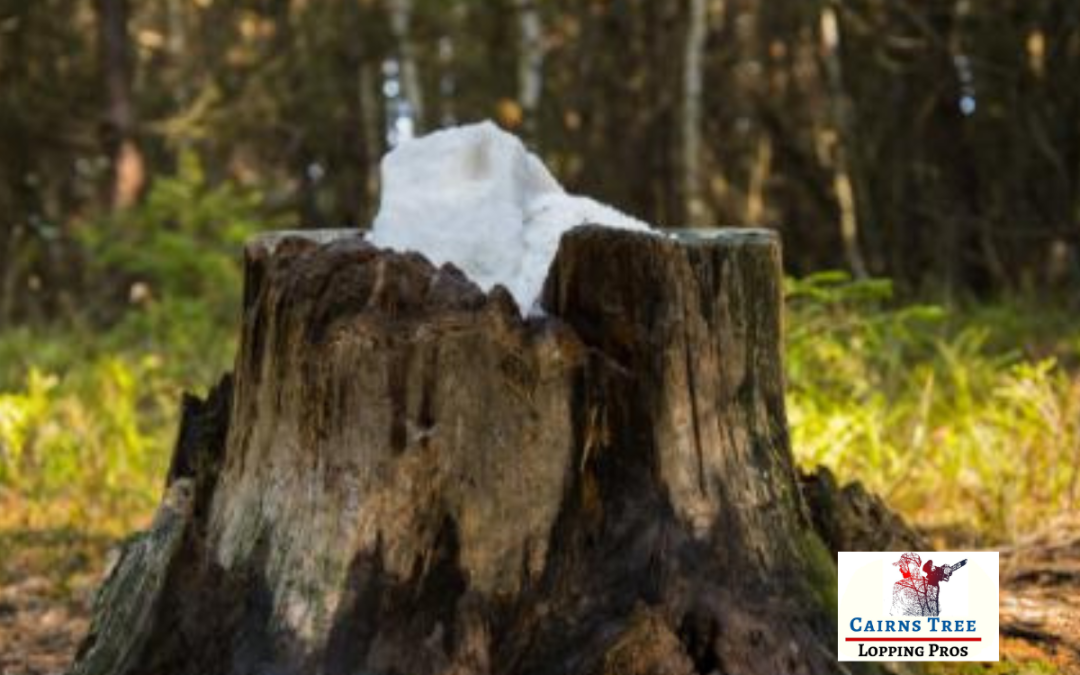You probably know that epsom salt can be used to easily and inexpensively repel animals from your garden. But you might not know that it also has natural antifungal properties, making it an ideal way to get rid of pesky tree stumps. If you’ve ever had a tree removed from your property, you may have left behind a stump that is either hard to see or nearly impossible to ignore. While many people will opt for removing the stump completely, this isn’t always the best option for everyone because of cost or limited time and energy. Thankfully, there are some simple ways to reduce the size of a tree stump so that it takes up less space and requires less maintenance moving forward.
Table of Contents
How to Remove a Tree Stump with Epsom Salt

If you have a tree stump on your property, you may be wondering how you can get rid of it. Tree stumps can ruin the look of a garden, and can even remain alive and cause problems in the future. One natural and budget-friendly way to remove a stump is with Epsom salts, but how can this common household item be utilized in tree stump removal?
When Do You Need Epsom Salt to Kill a Tree Stump?

If you have had a tree chopped down on your property, you might think the hard part is over, but actually, felling a tree is often just the beginning of the story when trying to remove a tree from your landscape. Although most of the visible part of the tree will have been removed, the tree’s stump will still be left, and the root system will still be intact.
While there are healthy roots, there is still life, and tree roots will often continue to absorb moisture and nutrients in an attempt to regrow. It is common to see tree stumps with saplings growing from them, and if left to grow, these can become full-sized new trees. Some stumps will even have several saplings sprout from them, which could lead to numerous trees growing in close proximity to each other, which can lead to many more problems.
The best way to prevent any of these issues is to remove the tree in its entirety, including the stump and all of the attached roots. Unfortunately, removing the stump of a tree can be very costly, time-consuming, and labor-intensive. There are several options when it comes to removing the remaining parts of a tree, and one of these options is by using Epsom salts. You might want to consider using Epsom salts to kill your tree stump if any of the following scenarios apply to you. Besides using Epsom salts to grow plants like tomatoes or roses, you can also use Epsom salts to kill tree stump gradually with very great results.
Low Budget
Hiring a tree surgeon or contractor to remove a remaining tree stump in your yard can run into thousands of dollars. Professionals will typically use heavy-duty equipment such as a stump grinder, or smaller tools like chainsaws and shovels. Whichever method they employ to remove the stump, it will typically take a whole day, or even longer, and labor costs can rack up.
Professional tree surgeons are well trained in these areas with plenty of experience of safely removing tree stumps using potentially dangerous equipment. For this reason, they are able to charge sums of money which can be unrealistic to many people.
If you are trying to keep costs low while removing your tree stump, then Epsom salt could offer a good solution. Epsom salt is very inexpensive, especially if bought in bulk. The added bonus of using Epsom salts is that if you have any leftovers after your tree stump is removed, you can use them in the bath or for other health purposes. This will mean that there is zero product wastage, so no money is wasted.
No Time Restraints
The benefit of hiring a tree surgeon, or attempting to manually remove a tree stump yourself, is that the job will be completed within a matter of hours or days. Using Epsom salts is a much longer process, as you will have to wait for the Epsom salts to dry out the roots and starve the tree of moisture and nutrition.
The time this takes can vary depending on the size of the stump, but you can expect to need a fair bit of patience. If you are not in a hurry to remove your tree stump, then an Epsom salt treatment could be an ideal natural and low-cost option.
Minimize Physical Work
Many DIY enthusiasts will attempt to remove a tree stump themselves by hacking it to pieces with an ax or chainsaw or trying to dig it out. For some people, who have experience in these areas, these may be valid options. But for the average homeowner, attempting a task of this size will prove to be too much.
Manually removing a tree stump from the ground is a daunting task that requires plenty of strength and stamina. If you would prefer not to get your hands dirty, then Epsom salts might be a better solution. The process of tree stump removal using Epsom salts is simple and requires little or no physical aspect, making it achievable for almost anyone.
Failed Commercial Chemical Stump Removal
If you’ve been looking for a chemical stump removal solution to minimize costs and physical exertion, then you may have thought about trying a commercial stump removal solution, or maybe you have tried one and found that it didn’t work.
Commercially available stump removal products are made from potassium nitrate, and these are effective at decomposing and dissolving a tree stump, which is already dead. However, if your tree stump still has healthy roots, then a commercial stump removal product will have little to no effect. A chemical stump removal solution with a much higher rate of success is Epsom salts.
Safety Concerns
There are many DIY methods of removing a tree stump, but most are not considered to be particularly safe. Some ideas for removing a tree stump yourself include chaining the stump to a pickup truck and driving away to wrench the stump out of the ground, along with setting fire to the stump or hacking it apart with a chainsaw. If these options sound too dangerous to you, then a chemical solution would be a much safer bet. Using Epsom salt to kill a tree stump is both safe and easy.
How Does Epsom Salt Kill a Tree Stump?
Epsom salt contains magnesium and sulfur. While these are nutrients plants need to survive, if used in excess, they can kill plants and weeds. Epsom salt is able to draw moisture out of everything it comes into contact with. When used as directed on a tree stump, Epsom salt will dry out the root system, and prevent it from absorbing the moisture and nutrients it needs to live. It will also dry out the tree stump itself, which will cause it to rot and break down, at which time it will be easy to manually remove.
Step-by-Step Guide to Using Epsom Salt to Kill a Tree Stump
There are two ways you can use Epsom salt to kill a tree stump, and which one you use will largely depend on whether you have a drill and are able to operate one.
Drilling Method
1. Using a 1-inch drill bit, drill several holes into the stump, leaving a few inches between each hole. Drill as deeply as you can; holes should have a minimum depth of 8 inches.
2. Pour Epsom salt directly into the drilled holes, filling them to the top.
3. Add enough water to the holes to moisten the salt. Do it slowly so that the salt doesn’t overflow (SF Gate).
4. Depending on the season, you may need to cover the stump over with a tarp. This will prevent rainwater from filling the holes and diluting the Epsom salts too much.
5. Repeat the process every three weeks until the stump is dead. Pale wood typically still has life left, while dark and brittle wood is dead.
This video below explains in details how to do the driling method.
Soaking Method
1. Mix together Epsom salts and water to a ratio of one part Epsom salts, two parts water. For each stump soak, the ideal amount is around one gallon of salts, and two gallons of water.
2. Drench the stump and any exposed roots with the mixture.
3. Cover the stump with a tarp, and repeat soaking every week until the stump appears visibly dried out.
Whichever method you use will result in the eventual drying out and rotting of the stump, though this may take several months. Once dead, the stump will decompose naturally, but you can speed up this process by adding a high nitrogen fertilizer around the base of the stump.
Alternatively, a rotten stump can be dug up and disposed of without too much trouble. You can then refill the hole with soil and cover it over with lawn seed, or create a new flower bed in its place. Another benefit of having used Epsom salt to kill the tree stump is that it will leave the surrounding soil in good condition compared to other chemical solutions, which can make it difficult to grow plants in the place of the stump after it has been removed.
Conclusion
Epsom salts kill a tree stump by drying out the roots and remaining trunk stump. They are a good option for removing tree stumps in a variety of situations, especially if you want a DIY option that is safe and isn’t physically demanding. Epsom salts provide a solution for tree stump removal that is low cost, easy to achieve, and doesn’t harm the environment.
The only drawback of using Epsom salts to kill a tree stump is that it can take an extended amount of time compared with other alternatives. If you are happy to wait a few months for Epsom salts to dry out your tree stump, then it could be the right solution for you.

